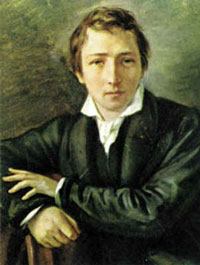Germany - OUT OF PRINT
A Winter's Tale

Admired by Marx, quoted by August Bebel in the Reichstag, published by Rosa Luxemburg on the eve of the Spartakist uprising, banned by the Nazis, re-written by Brecht and by Wolf Biermann, Heine's Germany: A Winter's Tale is one of the most political poems in European history. It is also one of the most entertaining, sometimes called 'the wittiest feuilleton in world literature'.
Published four years before the revolutions of 1848, it reflects the extent of Heine's friendship with Marx, and takes beautifully-judged satiric swipes at Prussian expansionism, German Romanticism, liberal complacency and a swarm of Heine's fellow writers. A work of sly wit, magical realism and epicurean relish, polemic and fantasy, the poem looks forward prophetically to the German future. Heine's chief concerns - exile, war and revolution, art and propaganda, political repression and cultural identity, the threat of hyper-power hegemony - are as relevant today as they were one hundred and sixty years ago.
Sample Poem
CAPUT 1
It was in the glum month of November,
with days growing overcast,
and the wind tearing leaves from the trees,
when I left for Germany at last;
and as I approached the border,
I felt a stronger pounding
against my ribs (I believe my eyes
even began to water);
and when I heard German spoken
I felt strange–as if, and this
is the only way I can put it–my heart
had haemorrhaged in bliss.
A little harpmaid was singing.
She sang with genuine feeling,
in a falsetto–and yet I was still
deeply moved by her keening.
She sang of love and love's sorrows,
of self–sacrifice, and of meeting
again, up in that better world
where ends all woe and grieving.
She sang of this wretched vale of tears
and of those friends, snatched too early
from us, of souls transfigured
by joy for all eternity.
She sang the old denial hymn,
the Pie–in–the–Sky–Bye–and–Bye
they croon to that dozing lout,
the People, when it stirs and cries.
But I know the tune, I know the text,
and I know all those authors–
how they secretly swig wine
while they publicly preach water.
I'll sing you a newer, better song
my friend–about how we want to build
the Kingdom of Heaven, right now,
right here, in this existing world.
We want to be happy on earth,
we won't put up with hunger–
why should the idle belly be stuffed
at the hands' expense any longer?
There's enough food for everyone–
come to that, enough roses too,
and myrtles, desire and beauty,
and, last but not least, garden peas.
Yes: sweet, juicy peas for everyone
as soon as the pea–pods split!
We'll leave Heaven for the angels
and the sparrows to inherit–
and if, after death, we still sprout wings,
we'll want to pay you visits
up there and, well, we'll dine with you
on blesséd tarts and biscuits.
So: a newer, better song–
one scored for fiddle and flute;
the miserere is outdated,
the passing–bells are clappered out.
The maiden Europa is betrothed
to that good–looking genius
Freedom; they lie there, embracing,
they've indulged in their first kiss.
And if priests withold their blessing
their vows are no less valid–
long live bridegroom and bride,
and the children of their marriage!
My song's pure epithalamium–
better, newer!–and in my soul,
stars of the most exalted
consecration are ascending–
inspired stars, they go nova
blending into fiery streams–
I feel miraculous strength; I could
smash oaks into smithereens!
Since I set foot on German soil,
magic juices have coursed my veins–
the giant is earthed to his mother,
and his powers revive again.




